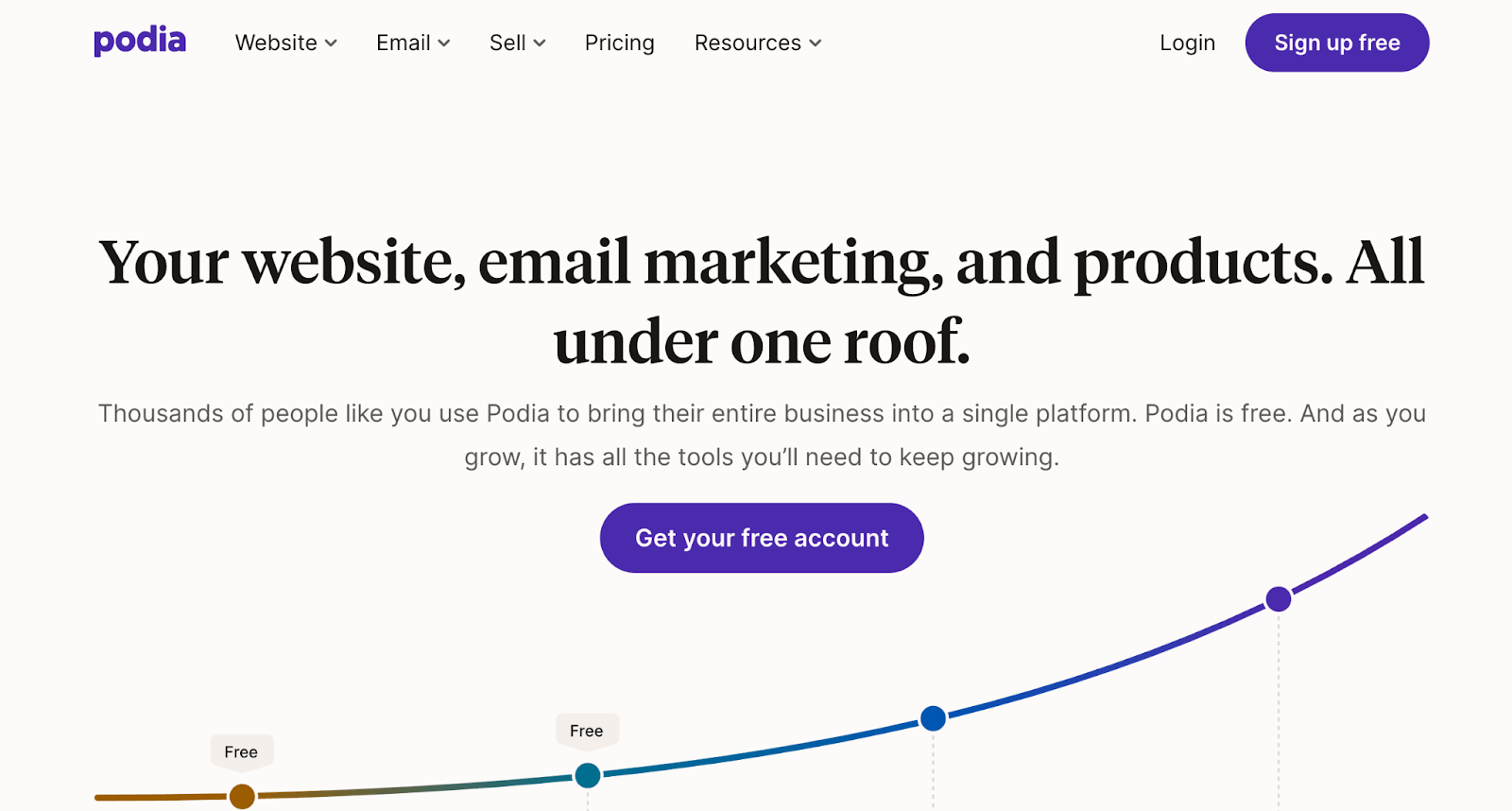5 Hottest Platforms to Sell Digital Products (With Pros and Cons)


Share this article

Are you interested in turning your knowledge or creative work into a source of income? Well, in our digital age, selling digital products has become an accessible and lucrative option. According to Statista, the transaction value in the Digital Commerce market is set to skyrocket to an astounding US$6.03 trillion in 2023! That’s more than the annual GDP of most countries.
Whether you're an educator, freelance consultant, or entrepreneur, you can turn your knowledge into cash. You can create your own digital products and courses and grab your share of this huge pie.
But it’s not as easy as it sounds. You have to conduct research first and choose the right platform to sell your digital products. In this article, we’ll discuss the 5 popular platforms that you could use to kickstart your digital product sales journey. A disclaimer: Different platforms may change their price and services from time to time. So, make sure you check their websites for the latest changes in their features and prices.
So, let’s dive into it.
Whether you're an educator, freelance consultant, or entrepreneur, you can turn your knowledge into cash. You can create your own digital products and courses and grab your share of this huge pie.
But it’s not as easy as it sounds. You have to conduct research first and choose the right platform to sell your digital products. In this article, we’ll discuss the 5 popular platforms that you could use to kickstart your digital product sales journey. A disclaimer: Different platforms may change their price and services from time to time. So, make sure you check their websites for the latest changes in their features and prices.
So, let’s dive into it.
KEY TAKEAWAYS
- Digital commerce is a rapidly growing market, with an estimated transaction value of US$6.03 trillion in 2023.
Kajabi is an all-in-one platform that has gained popularity among some top YouTubers like Brendon Burchard and Roberto Blake. Its comprehensive features are designed to simplify creating, marketing, and selling online courses and digital products. With its user-friendly interface and a wide range of tools, Kajabi is an attractive option for educators, entrepreneurs, and content creators looking to establish a solid online presence.


Pros:
- Easy to use: Kajabi's well-designed interface is accessible to users of all technical levels. This means you don’t have to be a tech professional to make the most of Kajabi.
- All-in-one: You can do everything from course hosting and website building to email marketing and payment processing with this platform.
- Professional website design: Kajabi offers many customizable templates that enable you to create visually appealing websites that align with your brand.
Cons:
- Price: Well, this platform comes with a big price tag. Kajabi's costs can be relatively high, which may be a barrier for smaller businesses or individuals who are starting out.
- No free plan: Kajabi offers a free trial for 14 days, but after that, you’re going to have to pay. There’s no long-term free plan.
- Transaction fees: Kajabi charges transaction fees on its lower-priced plans, and this can lower profitability for some creators who are on one of these plans.
Well, that’s a fancy name. As the name suggests, Teachable is a popular no-code, online course platform that empowers educators and entrepreneurs to create and distribute digital courses. With its user-friendly interface and a range of features, Teachable has become a popular choice for individuals looking to earn big bucks using their expertise.


Pros:
- Free plan: Well, it has a free plan—no credit card details required. How nice! This means you can slowly and steadily build your teaching brand for free.
- Intuitive course creation: Teachable offers an intuitive course creation process. So, users can easily upload videos, multimedia content, quizzes, and assignments, making the whole experience engaging for students.
- Customization: Users can personalize their course websites to match their brand. This ensures a cohesive and professional online presence.
Cons:
- Advanced features take time to learn: Mastering some of the more advanced customization options and integrations might be a challenge for some users. But you can learn as you go.
- Pay cut: Teachable charges transaction fees on its lower-tier plans which affects the profitability for course creators, especially those just starting their online businesses. You see, that free plan may come with high transaction costs when you start selling courses.
- Limited flexibility: While customization is available, the extent of design flexibility is somewhat limited on lower-priced plans.
3. Thinkific
With over 50,000 course creators using Thinkific, the platform has facilitated the completion of more than 100 million courses, resulting in a remarkable combined income of over $650 million. It’s an online course platform designed to facilitate the creation, marketing, and sale of online courses. With an easy interface and a suite of features, it's a popular choice for users looking to share their expertise and make money through their knowledge.
Pros:
- User-friendly: Thinkific is known for its simplicity, making it convenient for users with varying levels of technical know-how, including beginners.
- Diverse content styles: This platform enables the creation of courses in different formats, from video and quizzes to PDFs and multimedia, providing flexibility for course creators.
- More third-party integrations: Thinkific integrates with 90+ third-party apps, enhancing functionality and expanding your course's capabilities.
Cons:
- Limited features on the free plan: The free plan has limited features, which may restrict the options available to users who want to create more detailed and advanced courses.
- High costs for advanced features: Well, if you want access to advanced features, you’ll need to spend more money and opt for the Grow plan.
- The learning curve for customization: Even though the platform is user-friendly, users with more advanced customization needs may experience a learning curve when implementing highly customized course websites.
4. Udemy
Well, you’ve probably heard about this one. Udemy is one of the largest and most renowned online learning platforms, offering a vast library of courses across a wide range of topics. With millions of students and instructors, Udemy has established itself as a famous option for both learners and educators seeking to expand their skills or share their expertise.
Pros:
- Diverse course selection: Udemy boasts a comprehensive library of courses covering virtually every subject imaginable. This ensures that learners can find content relevant to their interests and needs. Also, this means that you can sell courses on any topic you like.
- Access to a large audience: This is Udemy’s biggest advantage. Udemy's vast user base provides an opportunity to reach millions of potential students, increasing the visibility of your courses.
- No upfront costs: Udemy allows you to create and publish courses without any initial investment. They host the content and handle payment processing.
Cons:
- Pricing restrictions: Udemy controls course pricing! This may limit your ability to set your desired pricing strategy.
- Revenue share: Udemy takes a substantial portion of course sales revenue, particularly for students who come through Udemy's marketplace.
- Limited branding: On Udemy, courses are primarily branded under the Udemy name, which can lower your ability to establish a strong personal brand.
Podia is an all-in-one platform designed to enable content creators, artists, and online entrepreneurs to monetize their digital products and services. Whether you're selling online courses, memberships, digital downloads, or webinars, Podia provides a complete solution to showcase, market, and distribute your content to a global audience.

And that brings us to the end of this article. You are encouraged to review more options before making a decision. Remember, every course creator has different aims and skills. The platform you choose should reflect that. It's an era of boundless digital growth and limitless possibilities. If you have any knowledge in any field, you may want to consider selling it digitally. You never know how many people out there will pay to learn what you know.
And if you’re a freelance consultant, you never know how many clients may be in need of your expertise. So, if you have experience working in top-tier firms and leading digital companies, we can help you find freelance consulting work. Visit our website to find out more.

Pros:
- Diverse digital products: You can sell various types of digital products on Podia, including online courses, memberships, webinars, and digital downloads.
- Customizable storefronts: Personal branding comes first. You can personalize your storefront and website to align with your brand's identity.
- No transaction fees: Yay! You keep the money. Podia doesn't charge transaction fees, meaning creators retain more of their earnings from each sale.
Cons:
- Pricing: While Podia offers a free plan, paid plans might be relatively more expensive for creators just starting out or those on a tight budget.
- Limited community interaction: While Podia offers a community feature, it may not be as robust as dedicated community-building platforms.
- Limited customization: Podia may not be as flexible as big platforms like Shopify and doesn't provide as much control over the design and functionality of your online storefront.
And that brings us to the end of this article. You are encouraged to review more options before making a decision. Remember, every course creator has different aims and skills. The platform you choose should reflect that. It's an era of boundless digital growth and limitless possibilities. If you have any knowledge in any field, you may want to consider selling it digitally. You never know how many people out there will pay to learn what you know.
And if you’re a freelance consultant, you never know how many clients may be in need of your expertise. So, if you have experience working in top-tier firms and leading digital companies, we can help you find freelance consulting work. Visit our website to find out more.
Share this article
Premium content,
on a weekly basis.
on a weekly basis.
Subscription implies consent to our privacy policy.
×


Premium Content, on a Weekly Basis
Subscribe to the Consultport Blog for expert insights on consulting, digital transformation, and the future of work, delivered straight to your inbox.

Discover our Consultant's Expertise
Ready to get access to the world’s best consultants?
